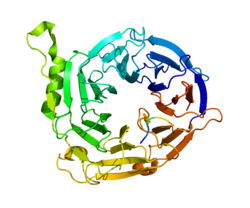Polycomb protein EED is a protein that in humans is encoded by the EED gene.[5][6][7]
- ^ a b c GRCh38: Ensembl release 89: ENSG00000074266 – Ensembl, May 2017
- ^ a b c GRCm38: Ensembl release 89: ENSMUSG00000030619 – Ensembl, May 2017
- ^ "Human PubMed Reference:". National Center for Biotechnology Information, U.S. National Library of Medicine.
- ^ "Mouse PubMed Reference:". National Center for Biotechnology Information, U.S. National Library of Medicine.
- ^ Rietzler M, Bittner M, Kolanus W, Schuster A, Holzmann B (Nov 1998). "The human WD repeat protein WAIT-1 specifically interacts with the cytoplasmic tails of beta7-integrins". J. Biol. Chem. 273 (42): 27459–66. doi:10.1074/jbc.273.42.27459. PMID 9765275.
- ^ Schumacher A, Lichtarge O, Schwartz S, Magnuson T (Jan 1999). "The murine Polycomb-group gene eed and its human orthologue: functional implications of evolutionary conservation". Genomics. 54 (1): 79–88. doi:10.1006/geno.1998.5509. PMID 9806832.
- ^ "Entrez Gene: EED embryonic ectoderm development".






